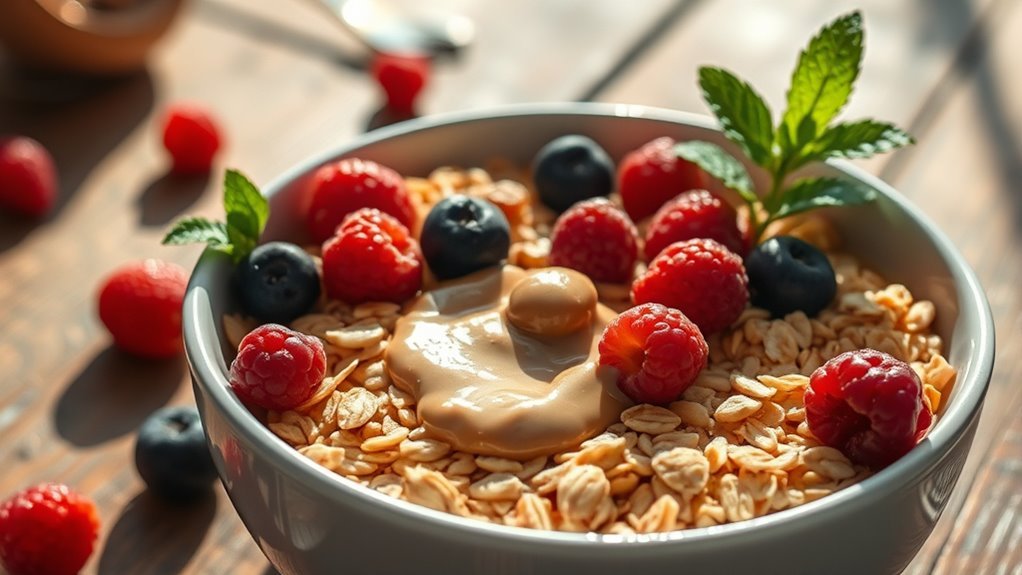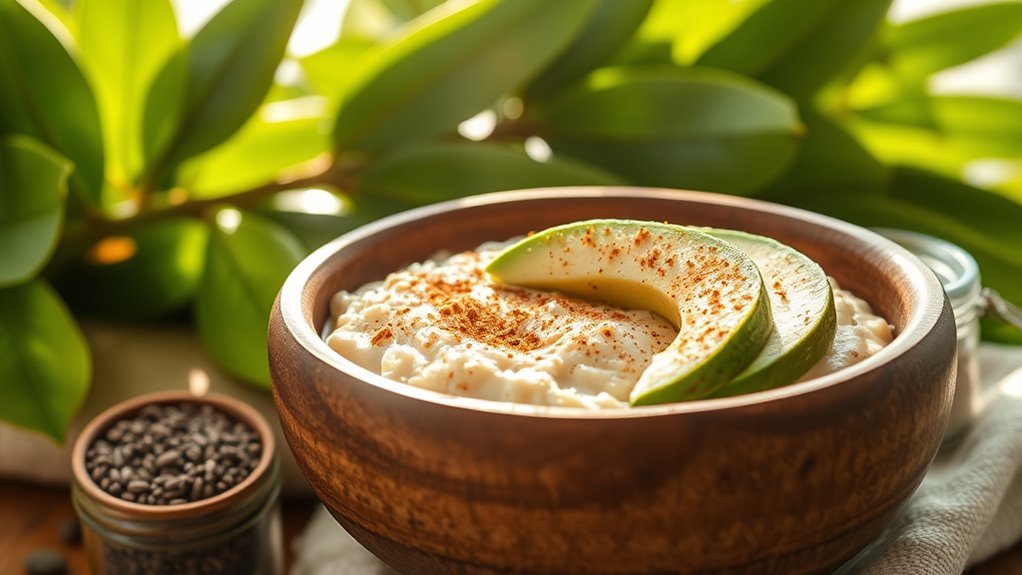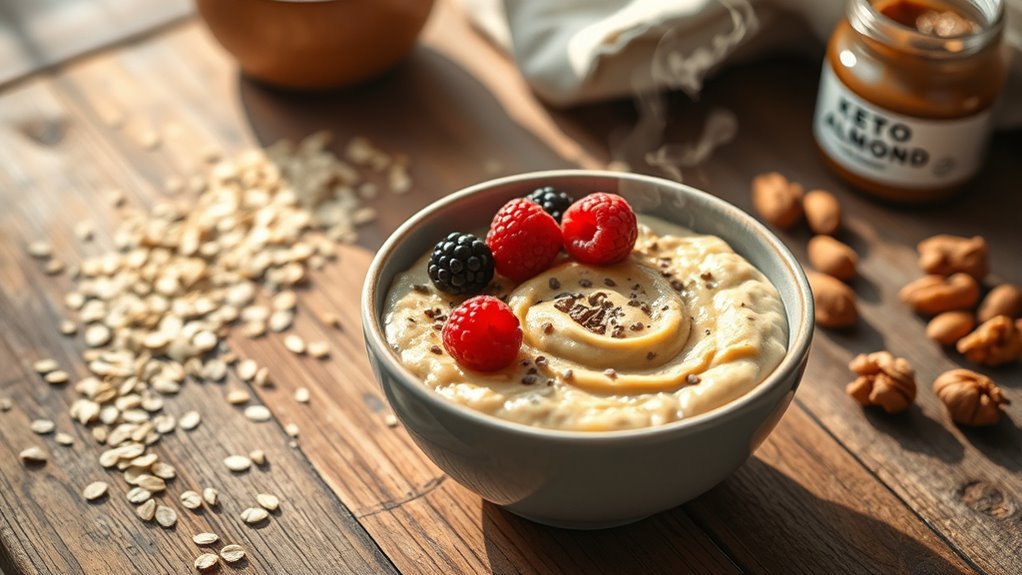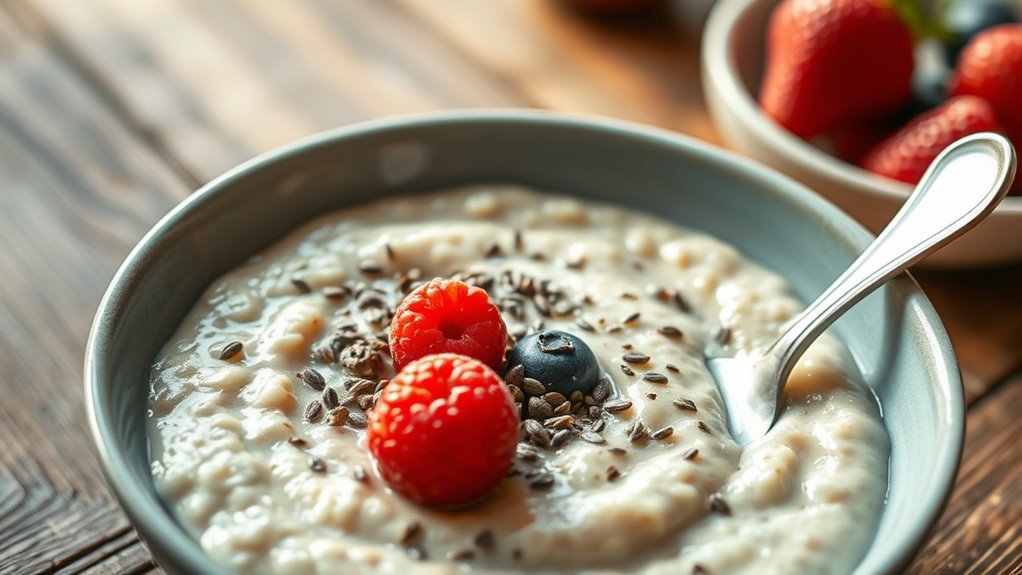While oats are nutritious, they’re generally too high in carbohydrates to fit into a strict keto diet. Even small servings can disrupt ketosis, as oats contain around 50-72 grams of net carbs per 100g, depending on the type. If you’re aiming to maintain ketosis, it’s better to explore low-carb alternatives like chia seeds or almond flour. Knowing how oats might affect your body can inform your choices, and there’s plenty more to take into account about making low-carb decisions.
Understanding the Keto Diet and Carbohydrate Limits

When you’re diving into the ketogenic diet, it’s important to grasp the concept of carbohydrate limits, as they play a crucial role in achieving and maintaining ketosis. Fundamentally, you’ll need to focus on strict carb counting to stay within your daily limit, typically around 20-50 grams of net carbs. This means being mindful of dietary restrictions and understanding which foods can fit into your meal plan. While it may feel restrictive at first, many find freedom in discovering new low-carb options. Balancing your macronutrients will help you achieve your goals without feeling deprived. Remember, the key is consistency and awareness of what you’re consuming, allowing you to enjoy the benefits of ketosis while steering your food choices confidently.
Nutritional Profile of Oats

Oats are often lauded for their nutritional benefits, making them a popular choice in many diets. When you look at their nutritional profile, you’ll find oats rich in fiber, particularly beta-glucan, which is known for its heart health benefits. This soluble fiber can help lower cholesterol levels and improve gut health. Oats also provide essential vitamins and minerals, including manganese, phosphorus, and iron, contributing to overall oat health. Additionally, the complex carbohydrates in oats can offer steady energy, making them a great option for maintaining blood sugar levels throughout the day. While you consider oat benefits, remember that moderation is key, especially if you’re mindful of your carbohydrate intake.
The Impact of Oats on Ketosis

Although oats are celebrated for their health benefits, their carbohydrate content can pose challenges for those following a ketogenic diet. When you consume oats, your body engages in oat digestion, converting those carbs into glucose. This process can greatly hinder your ability to maintain ketosis, the metabolic state where your body primarily burns fat for fuel instead of carbs. Even a small serving of oats can lead to an increase in blood sugar levels, which contradicts the keto goal of minimizing carbohydrate intake. While oats provide fiber and nutrients, their potential to disrupt ketosis impact makes them a tricky choice. If you’re committed to keto, you may want to explore alternatives that align better with your dietary goals.
Exploring Different Types of Oats
When considering oats for your diet, it’s important to understand the various types available and their carb content. Some oat varieties, like steel-cut and rolled oats, differ considerably in how they impact your carb intake. Additionally, exploring keto-friendly alternatives can help you make informed choices that align with your dietary goals.
Oat Varieties Explained
While you might think of oats as a single ingredient, several varieties exist, each with unique characteristics and nutritional profiles. Understanding these oat types can help you choose the right one for your dietary needs. Steel-cut oats have a coarse texture and take longer to cook, offering a chewy bite. Rolled oats are steamed and flattened, resulting in a softer texture and quicker cooking time. Instant oats are pre-cooked and dehydrated, making them convenient but often less nutritious. Oat groats, the whole kernel, provide the most fiber and nutrients but require the longest cooking time. Each variety has its own flavor and texture, so experimenting with them could help you find your favorite while ensuring you enjoy your meals.
Carb Content Comparison
Choosing the right type of oats for your keto diet involves more than just understanding their textures and cooking times; it’s also about their carbohydrate content. Different oats vary greatly in carbs, which can impact your ketosis. Here’s a quick comparison:
| Type of Oats | Net Carbs (per 100g) | Glycemic Index |
|---|---|---|
| Steel-Cut Oats | 50g | 42 |
| Rolled Oats | 66g | 55 |
| Instant Oats | 72g | 83 |
| Oat Fiber | 7g | 0 |
While oat fiber is low in carbs and has a glycemic index of zero, traditional oats are higher in carbs, potentially disrupting ketosis. Always consider your carb intake when choosing oats.
Keto-Friendly Alternatives
If you’re looking to maintain a keto-friendly lifestyle but still want to enjoy the benefits of oats, there are several alternatives you can consider. Chia seeds and flaxseed meal are excellent substitutes that provide a similar texture and can be used to create oatmeal-like dishes. You might also try cauliflower rice mixed with spices for a savory option. For those craving a sweeter taste, incorporating almond flour or coconut flour into your keto smoothies can mimic the creaminess of oats without the carbs. Don’t forget to add low-carb oatmeal toppings like berries, nuts, or seeds to enhance flavor and nutrition. These alternatives can help you stay within your carb limits while still enjoying delicious meals.
Alternative Low-Carb Grains and Seeds
When you’re on a keto diet, finding suitable alternatives to traditional grains can be challenging, but several low-carb options can fit seamlessly into your meal plan. Quinoa, while slightly higher in carbs, boasts numerous benefits such as being a complete protein and rich in fiber, making it a great choice in moderation. Chia seeds are another fantastic option; they’re low in carbs and packed with omega-3s and antioxidants.
Here’s a quick comparison of these alternatives:
| Grain/Seed | Net Carbs (per 1 oz) |
|---|---|
| Quinoa | 19g |
| Chia Seeds | 1g |
Incorporating these options can help you maintain a balanced and satisfying keto diet without the need for traditional oats.
Tips for Enjoying Oats on a Keto Diet
When you’re managing oats on a keto diet, it’s important to explore alternatives that fit your carb limits. Consider portion control strategies to keep your intake in check, and think about combining oats with low-carb foods for a balanced meal. These tips can help you enjoy oats without compromising your dietary goals.
Oat Alternatives to Consider
Although oats are often hailed for their health benefits, they may not fit well within the strict carbohydrate limits of a keto diet. Luckily, there are several oat alternatives you can enjoy. Consider quinoa flakes, which provide a similar texture and are lower in carbs. Chia seeds are another fantastic option; they’re high in fiber and can create a pudding-like consistency when soaked in liquid. Flax meal offers healthy fats and can be mixed into smoothies or baked goods for added nutrition. Ultimately, coconut flour is a versatile choice that works well in keto recipes, giving you that satisfying fullness. These alternatives allow you to maintain a low-carb lifestyle while still enjoying hearty meals and snacks.
Portion Control Strategies
Finding the right balance is key to enjoying oats while sticking to a keto diet. Start by incorporating oats into your meal planning with careful attention to portion sizes. A small serving, like a quarter cup of rolled oats, can provide fiber and satisfaction without exceeding your carb limits. Consider measuring your oats to avoid overindulging, and pair them with low-carb ingredients like nuts or seeds to enhance flavor and nutrition. You can also experiment with recipes that allow you to stretch your oats further while maintaining keto compliance. Remember, it’s all about enjoying oats in moderation so you can still thrive on your keto journey while savoring your meals.
Combining With Low-Carb Foods
To fully enjoy oats on a keto diet, combining them with low-carb foods can enhance both their flavor and nutritional profile. Here are some great oat meal combinations you can try:
- Nut butter: Almond or peanut butter adds healthy fats and protein.
- Chia seeds: Boost fiber and omega-3 content while keeping carbs low.
- Berries: Opt for a small handful of raspberries or blackberries for antioxidants and a touch of sweetness.
- Coconut milk: Use this creamy alternative to add richness without the carbs.
These low carb pairings not only make your oats more satisfying but also help maintain your keto lifestyle. Experimenting with these combinations can keep your meals exciting and aligned with your dietary goals!
Recipes to Incorporate Oats While Staying Low-Carb
While oats are often associated with high-carb diets, there are creative ways to incorporate them into low-carb recipes that align with your keto lifestyle. Consider making oatmeal recipes using rolled oats or oatmeal flour in moderation. You can whip up a delicious keto-friendly oatmeal by combining oats with almond milk and adding low-carb toppings like nuts, seeds, or a sprinkle of cinnamon. Another option is to create oatmeal pancakes using ground oats, eggs, and cream cheese, topped with sugar-free syrup or fresh berries. These recipes not only satisfy your cravings but also allow you to enjoy oats without derailing your diet. Embrace the freedom to experiment while keeping your carb count in check!
Listening to Your Body: Individual Responses to Oats
How do your body and metabolism respond to oats when you’re on a keto diet? It’s vital to recognize that individual responses can vary greatly. Your personal tolerance to oats may affect your overall experience with the diet. Here are some factors to reflect on:
Understanding your body’s unique response to oats is crucial for navigating the keto diet effectively.
- Blood Sugar Levels: Monitor how oats impact your glucose levels; they can spike in some individuals.
- Digestive Responses: Pay attention to any bloating or discomfort after consumption.
- Satiety: Oats can provide a feeling of fullness, which might help or hinder your keto goals.
- Nutrient Absorption: Reflect on how oats influence your absorption of other nutrients.
Listening to your body is important. Adjusting your intake based on these responses can empower your keto journey.
Frequently Asked Questions about Eating Oats on a Keto Diet
1. Can I eat oats on a keto diet?
While oats are a healthy whole grain and provide various nutrients, they are not typically recommended for a strict keto diet. This is primarily because oats are high in carbohydrates, which can hinder the process of ketosis—the metabolic state that keto dieters aim for. A standard serving of oats can contain around 27 grams of carbohydrates, which exceeds the daily carb limit for most people following keto, usually set at 20-50 grams.
2. Are there any alternatives to oats that fit a keto diet?
Yes, there are several alternatives to oats that are keto-friendly. Some popular options include chia seeds, flaxseed meal, and almond flour. Chia seeds and flaxseeds are high in fiber and healthy fats while being low in net carbohydrates. Almond flour can be used to create pancakes or baked goods that resemble oatmeal in texture but are much lower in carbs.
3. What are the health benefits of oats?
Oats are rich in important nutrients such as fiber, protein, vitamins, and minerals. They can help lower cholesterol levels, improve heart health, and stabilize blood sugar levels due to their high beta-glucan content. Additionally, oats can promote satiety, making them a great food choice for weight management. However, these benefits are most relevant for those not on a keto diet, as the high carbohydrate content may conflict with keto dietary goals.
4. How can I incorporate oats into a low-carb diet?
If you are following a low-carb diet rather than a strict keto diet, you might consider incorporating small amounts of oats. One approach is to limit portion sizes and combine oats with low-carb ingredients like unsweetened almond milk, nuts, or seeds to keep the overall carbohydrate intake in check. Experimenting with overnight oats using low-carb sweeteners and toppings can also provide a satisfying meal while adhering to lower carb guidelines.
5. What should I consider before eating oats on a keto diet?
Before incorporating oats into your keto diet, consider your individual carbohydrate tolerance and health goals. Monitor your body’s response and whether consuming oats impacts your ability to maintain ketosis. It’s also essential to account for the total carb intake from all food sources throughout the day. If you’re unsure, consult with a healthcare professional or a nutritionist to determine what works best for your lifestyle and dietary preferences.
References
- https://www.ncbi.nlm.nih.gov/pmc/articles/PMC6323441/
- https://www.healthline.com/nutrition/keto-diet-foods
- https://www.webmd.com/diet/obesity/what-is-the-keto-diet
- https://www.mayoclinic.org/healthy-lifestyle/nutrition-and-healthy-eating/in-depth/keto-diet/art-20460084
- https://www.diabetes.org/nutrition/healthy-foods/keto-diet
- https://www.verywellfit.com/the-keto-diet-and-its-effect-on-nutrition-5208354
- https://www.journalofnutrition.org/content/147/12/2174S
- https://www.cdc.gov/healthyweight/healthy_eating/index.html
- https://www.hsph.harvard.edu/nutritionsource/keto-diet/


